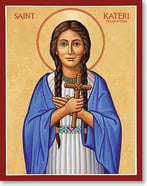“You, O Lord, abide forever, and Your name through all generations. … The nations shall revere Your name, O Lord, and all the kings of the earth your glory, when the Lord has rebuilt Zion and appeared in His glory.” (Psalm 102:13,16).
Reflections on the readings for the Memorial of St. Kateri Tekakwitha (July 14, 2022): IS 26:7-9,12,16-19; PS 102:13-14,15,16-18,19-21; MT 11:28-30
MISSIO offers “Preaching Mission,” as a homily help, providing connections to mission from the readings of Sundays, Feast Days and Holy Days.
Declared venerable in 1943, she was named a saint in 2012, the first Native American woman to be canonized. St. Kateri Tekakwitha is now honored as patron of ecology and the environment.
Born in 1656 in upstate New York, St. Kateri Tekakwitha’s mother was an Algonquin Christian and her father a Mohawk chief. They both died of smallpox when she was four. The same disease caused her severe scarring and severe damage to her vision. Tekakwitha, the name she came to be called by her people, means “one who walks groping her way.” Like the other youngsters, she learned the skills expected of her and worked hard to contribute to the family and community. While she was attracted to the faith of her mother from her childhood, the relatives who raised her, as well as other members of her village, were opposed to Christianity and the Jesuit priests who taught it. Finally, when in her teens, she was able to spend some time learning from these missionaries. She was baptized when she was 19, taking the name Kateri, the Mohawk version of Catherine. Because her life was made very difficult by those around her, she trekked 200 miles to Kahnawake, or Sault St. Louis, a Christian settlement of native people near Montreal. It was there that she received her First Communion and spent the rest of her brief life.
An 18th century biography of Kateri Tekakwitha notes that one of the Jesuit priests who knew her best “was astonished to find in her, immediately after baptism, not a neophyte needing to be confirmed in the faith, but a soul filled with the most precious gifts of heaven who had to be guided in the most sublime spiritual ways.” While she worked to support herself, she also spent hours in prayer daily, and practiced penance including long fasts. The young woman had long desired to remain a virgin. Under the guidance of an older Iroquois woman and with the permission of her spiritual advisor, she made a vow of virginity. Kateri’s health had never been good and it began to deteriorate. During Holy Week, 1680, she died at age 24. Declared venerable in 1943, she was named a saint in 2012, the first Native American woman to be canonized. St. Kateri Tekakwitha is now honored as patron of ecology and the environment.





